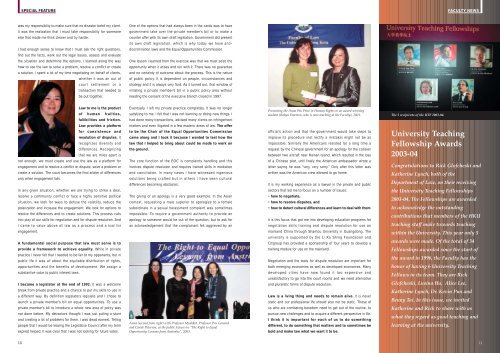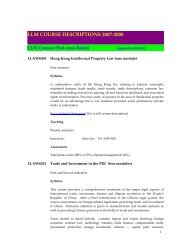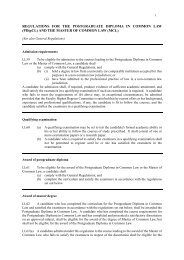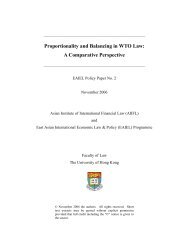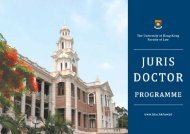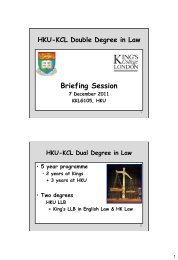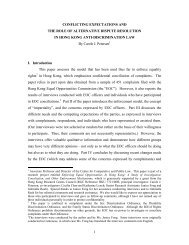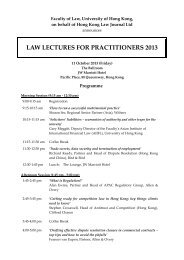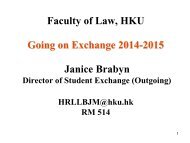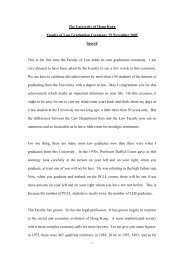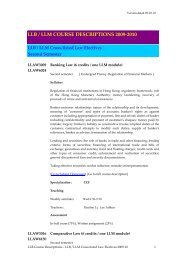Spring 2005 - Faculty of Law, The University of Hong Kong
Spring 2005 - Faculty of Law, The University of Hong Kong
Spring 2005 - Faculty of Law, The University of Hong Kong
Create successful ePaper yourself
Turn your PDF publications into a flip-book with our unique Google optimized e-Paper software.
SPECIAL FEATURE<br />
FACULTY NEWS<br />
was my responsibility to make sure that no disaster befell my client.<br />
One <strong>of</strong> the options that had always been in the cards was to have<br />
It was the realization that I must take responsibility for someone<br />
government take over the private member’s bill or to make a<br />
else that made me think clearer and try harder.<br />
counter <strong>of</strong>fer with its own draft legislation. Government did present<br />
its own draft legislation, which is why today we have anti-<br />
I had enough sense to know that I must ask the right questions,<br />
discrimination laws and the Equal Opportunities Commission.<br />
find out the facts, work out the legal issues, assess and evaluate<br />
the situation and determine the options. I learned along the way<br />
One lesson I learned from the exercise was that we must seize the<br />
how to use the law to solve a problem, resolve a conflict or create<br />
opportunity when it arises and run with it. <strong>The</strong>re was no guarantee<br />
a solution. I spent a lot <strong>of</strong> my time negotiating on behalf <strong>of</strong> clients,<br />
and no certainty <strong>of</strong> outcome about the process. This is the nature<br />
whether it was an out <strong>of</strong><br />
<strong>of</strong> public policy. It is dependent on people, circumstances and<br />
court settlement or a<br />
strategy and it is always very fluid. As it turned out, that window <strong>of</strong><br />
transaction that needed to<br />
initiating a private member’s bill in a public policy area without<br />
be put together.<br />
needing the consent <strong>of</strong> the executive branch closed in 1997.<br />
<strong>Law</strong> to me is the product<br />
<strong>of</strong> human frailties,<br />
fallibilities and friction.<br />
Eventually, I left my private practice completely. It was no longer<br />
satisfying to me. I felt that I was not learning or doing new things. I<br />
had done many transactions, advised many clients on infringement<br />
Presenting the Anna Wu Prize in Human Rights to an award-winning<br />
student (Robyn Emerton, who is now teaching at the <strong>Faculty</strong>), 2001.<br />
<strong>The</strong> 5 recipients <strong>of</strong> the UTF 2003-04.<br />
<strong>Law</strong> provides a platform<br />
for coexistence and<br />
resolution <strong>of</strong> disputes. It<br />
recognizes diversity and<br />
differences. Recognizing<br />
that we are miles apart is<br />
not enough, we must create and use the law as a platform for<br />
engagement and to resolve a conflict or dispute, solve a problem or<br />
create a solution. <strong>The</strong> court becomes the final arbiter <strong>of</strong> differences<br />
only when engagement fails.<br />
In any given situation, whether we are trying to strike a deal,<br />
resolve a community conflict or face a highly sensitive political<br />
situation, we look for ways to defuse the volatility, reduce the<br />
polarization and increase the engagement. We look for options to<br />
resolve the differences and to create solutions. This process calls<br />
into play all our skills for negotiation and for dispute resolution. And<br />
I came to value above all law as a process and a tool for<br />
engagement.<br />
A fundamental social purpose that law must serve is to<br />
provide a framework to achieve equality. While in private<br />
practice I never felt that I needed to be fair to my opponents, but in<br />
public life it was all about the equitable distribution <strong>of</strong> rights,<br />
opportunities and the benefits <strong>of</strong> development. We assign a<br />
substantive value to public interest laws.<br />
I became a legislator at the end <strong>of</strong> 1992. It was a welcome<br />
break from private practice and a chance to put my skills to use in<br />
a different way. By definition legislators legislate and I chose to<br />
launch a private member’s bill on equal opportunities. To use a<br />
private member’s bill to introduce a whole new area <strong>of</strong> policy was<br />
not done before. My detractors thought I was just pulling a stunt<br />
and creating a lot <strong>of</strong> problems for them. I was dead earnest. Telling<br />
people that I would be leaving the Legislative Council after my term<br />
expired helped. It was clear that I was not looking for future votes.<br />
matters and even litigated in a few esoteric areas <strong>of</strong> law. <strong>The</strong> <strong>of</strong>fer<br />
to be the Chair <strong>of</strong> the Equal Opportunities Commission<br />
came along and I took it because I wanted to test how the<br />
law that I helped to bring about could be made to work on<br />
the ground.<br />
<strong>The</strong> core function <strong>of</strong> the EOC is complaints handling and this<br />
involves dispute resolution and requires trained skills in mediation<br />
and conciliation. In many cases I have witnessed ingenious<br />
solutions being crafted but in others I have seen cultural<br />
differences becoming obstacles.<br />
<strong>The</strong> giving <strong>of</strong> an apology is a very good example. In the Asian<br />
context, requesting a male superior to apologize to a female<br />
subordinate in a sexual harassment complaint was sometimes<br />
impossible. To require a government authority to provide an<br />
apology to someone would be out <strong>of</strong> the question; but to ask for<br />
an acknowledgement that the complainant felt aggrieved by an<br />
Anna (second from right) with Pr<strong>of</strong>essor Mushkat, Pr<strong>of</strong>essor Pru Goward<br />
and Carole Peterson, at the public lecture on “<strong>The</strong> Right to Equal<br />
Opportunity: Lessons from Australia”, 2003.<br />
<strong>of</strong>ficial’s action and that the government would take steps to<br />
improve its procedure (not rectify a mistake) might not be as<br />
impossible. Similarly the Americans resisted for a long time a<br />
request by the Chinese government for an apology for the collision<br />
between two aircraft near Hainan Island, which resulted in the loss<br />
<strong>of</strong> a Chinese pilot, until finally the American ambassador wrote a<br />
letter saying he was “very, very sorry.” Only after this letter was<br />
written was the American crew allowed to go home.<br />
It is my working experience as a lawyer in the private and public<br />
sectors that led me to focus on a number <strong>of</strong> issues:<br />
• how to negotiate,<br />
• how to resolve disputes, and<br />
• how to detect cultural differences and learn to deal with them<br />
It is this focus that got me into developing education programs for<br />
negotiation skills training and dispute resolution for use on<br />
mainland China through Shantou <strong>University</strong> in Guangdong. <strong>The</strong><br />
university is supported by the Li Ka Shing Foundation and<br />
Citigroup has provided a sponsorship <strong>of</strong> four years to develop a<br />
training module for use on the mainland.<br />
Negotiation and the tools for dispute resolution are important for<br />
both emerging economies as well as developed economies. Many<br />
developed cities have now found it too expensive and<br />
unsatisfactory to go into the court rooms and we need alternative<br />
and pluralistic forms <strong>of</strong> dispute resolution.<br />
<strong>Law</strong> is a living thing and needs to remain alive. It is never<br />
static and our pr<strong>of</strong>essional life should also not be static. Those <strong>of</strong><br />
us who are combating boredom need to get out <strong>of</strong> the routine, to<br />
pursue new challenges and to acquire a different perspective in life.<br />
I think it is important for each <strong>of</strong> us to do something<br />
different, to do something that matters and to sometimes be<br />
bold and make law what we want it to be.<br />
<strong>University</strong> Teaching<br />
Fellowship Awards<br />
2003-04<br />
Congratulations to Rick Gl<strong>of</strong>cheski and<br />
Katherine Lynch, both <strong>of</strong> the<br />
Department <strong>of</strong> <strong>Law</strong>, on their receiving<br />
the <strong>University</strong> Teaching Fellowships<br />
2003-04. <strong>The</strong> Fellowships are awarded<br />
to acknowledge the outstanding<br />
contributions that members <strong>of</strong> the HKU<br />
teaching staff make towards teaching<br />
within the <strong>University</strong>. This year only 5<br />
awards were made. Of the total <strong>of</strong> 34<br />
Fellowships awarded since the start <strong>of</strong><br />
the award in 1996, the <strong>Faculty</strong> has the<br />
honor <strong>of</strong> having 6 <strong>University</strong> Teaching<br />
Fellows in its team. <strong>The</strong>y are Rick<br />
Gl<strong>of</strong>cheski, Lusina Ho, Alice Lee,<br />
Katherine Lynch, Dr. Kevin Pun and<br />
Benny Tai. In this issue, we invited<br />
Katherine and Rick to share with us<br />
what they regard as good teaching and<br />
learning at the university.<br />
10<br />
11


